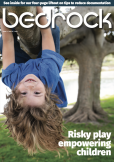“The original idea for the conference was to network with other early years teachers and share the amazing things happening at St John’s in the early childhood education and care (ECEC) space,” Deb said.
“More recently, the purpose has evolved to bring early teachers together to consider current trends in education with a hands-on, practical focus that can be taken back and taught in the classroom the very next day,” she said.
Although the conference targets ECEC teachers and assistants working with children from infants to Year 2, staff from primary and secondary cohorts who have attended report gaining valuable insights and learnings they have adapted to their professional practice when teaching older students.
Connecting early years educators
Ronnelle said the St John’s conference was an important event for ECEC professionals.
“Often at other conferences, the focus is on middle to upper years, and early years teachers must adapt any concepts to their age brackets.
“Our event is specifically for staff in the prior to school settings, which is a unique place, yet crucial as the foundation for all future learning,” she said.
A growth mindset in maths
Each conference has a particular theme, with the 2024 topic being Growth Mindsets in Mathematics.
Developed by psychologist Carol Dweck, a growth mindset refers to the belief that abilities and intelligence are not fixed traits, rather, they can be developed through effort, learning and perseverance.
Deb said that a growth mindset is crucial in the context of mathematics because it influences how children approach challenges, setbacks, and learning opportunities.
“A growth mindset encourages persistence, promotes resilience and fosters a love for learning,” Deb said.
“Children with a growth mindset are more likely to persist through difficult problems and challenges and understand that struggling is part of the learning process and persistence leads to improvement and success,” she said.
When faced with mistakes or failures, children with a growth mindset see these as opportunities to learn and grow rather than as a reflection of their abilities.
“This resilience helps them to tackle increasingly complex mathematical concepts with a positive attitude,” Deb said.
A growth mindset perspective can make learning mathematics more enjoyable and less intimidating.
Ronelle said embracing a growth mindset encourages children to approach maths problems creatively and explore different strategies.
“Children are more likely to develop critical thinking skills and engage in problem-solving processes,” Ronelle said.
“When children believe their abilities can improve, they are more likely to approach challenges with confidence.
“The self-assurance contributes to a more positive attitude towards maths and a higher achievement,” she said.
Anxiety around maths is relatively common in children, but in the early years, staff can help reduce fear of failure by focusing on growth rather than innate ability.
“Incorporating a growth mindset into maths education involves encouraging students to embrace challenges, celebrate effort and view mistakes as learning opportunities,” Deb said.
Early childhood education professionals can supportthis mindset by providing constructive feedback, praising effort over innate ability and modelling resilience in the face of difficulty.
A positive attitude
A positive attitude towards mathematics during the formative early years is important for children’s development, and numeracy skills provide an important foundation for lifelong learning and development.
Ronnelle said hands-on and play-based activities that utilise the natural world around children make maths fun.
“Young children use mathematical concepts to make sense of their world and connect these concepts with their environment and daily activities,” she said.
“It is not enough to merely teach concepts – children need engaging approaches, tools and resources that will spark curiosity and enthusiasm.
“Engaging with their natural play opportunities and current interests is important, as is combining curriculum areas so children can see the link between them,” Ronnelle said.
Deb said the conference would provide attendees with practical strategies to captivate children’s interests in maths and develop their growth mindsets.
“It’s an opportunity to learn from a range of ECEC experts, including our 2024 keynote speaker, Dr Eva DeVries – a numeracy coach, mathematics consultant and researcher,” she said.
Ronnelle said the upcoming conference would empower educators who want to engage young children more in maths.
“We strongly encourage members working in ECEC to register for the upcoming conference, being held at St John’s on November 25,” she said.
“They’re an excellent opportunity to network with colleagues and improve your professional practice.”
For more information and to register your attendance at the 2024 St John’s Early Years Conference, visit:stjohnsanglicancollege.com.au/event/early-years-conference-2024/













































































































































